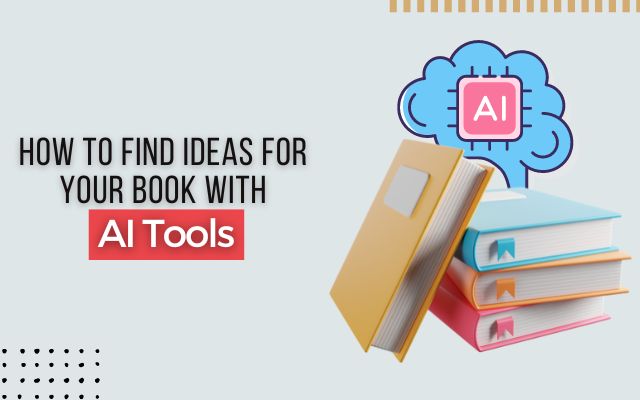Have you exhausted ideas for your next self-publishing stint? Are you going through writer’s block? Are you worried about losing followers on social media due to the lack of content? Coming up with interesting topics, ideas, and stories to write about is often a challenge for writers, no matter how established they are. But what if we say we know a way that makes it easier for you to find unlimited content ideas for book, blogs, ads, and social media?
Today, we will talk about AI in this blog and how AI tools, like ChatGPT, can potentially support authors and content creators at every stage of their book publishing process.
Woes of Modern-Day Writers…
It isn’t easy to be an author today. As a modern-day writer, you not only have to self-publish books but also generate content for social media posts, book promotion activities, and other advertisement strategies in order to be present and competitive.
Regardless of how experienced you are as an author, creating relevant, original, and inspiring content for your readers on a regular basis is important.
For instance, the more blogs you write, the more keywords your website will rank in search results. The more social media ads or YouTube videos you make, the more people will follow you, leading to more readers, visitors, and book sales.
However, the problem is producing fresh new content, again and again, to keep up with the audience’s demands.
This is where AI tools come to aid. Authors can find all the help they need to find content ideas for book with Artificial Intelligence. In fact, AI-assisted writing has been making waves in the past couple of years.
Let’s find out what it is.
AI-Assisted Book Writing and Use Cases
AI-assisted book writing uses Artificial Intelligence Technologies to help authors in the process of book writing and book publishing.
Depending upon the ultimate goal of an author, various techniques and tools can be used in AI-assisted book writing.
For Book Writing
For instance, one common approach is using AI tools to develop new topics for non-fiction books and blogs or find story content ideas for books.
Another crucial approach writers can use AI is analyzing books written by bestselling authors and other works to identify themes, writing patterns, and book structures that can be applied in authoring a new book.
For example, ChatGPT’s natural language processing technology (NPL) can help a self-publishing author identify important phrases, languages, tones, and other elements of book writing common in bestsellers in a particular genre or subgenre.
For Book Publishing
AI language model tools may also be used to generate interesting book descriptions, metadata, book summaries, and outlines of any book based on the author’s input.
For example, you can ask an AI tool to summarize an existing book, chapter, or journal that you need as a foundation to write your own book.
Another common approach is to use AI tools to produce human-like natural texts, such as funny book descriptions, captivating author bios, or viral social media captions based on the author’s queries.
The most recent version of ChatGPT has 175 billion parameters and is one of the most advanced, friendly, and powerful language models available for book publishing.
Ways to Use AI Tools for Book Writing and Self-Publishing
As readers demand more content in different channels, self-publishing authors need to meet the demand with relevant and engaging creatives, apart from writing great books.
AI can ease the process by providing you with real-world examples and ideas. However, the quality and quantity of the output depend upon how well you form your question prompts for the tool.
Content Ideas for Different Channels like Instagram, Email Marketing, Newsletter, etc.
If you struggle to find inspiration for your next Instagram post or email or are working on a tight schedule, you can simply use an AI tool to generate viral ideas.
Idea generation is one of the best and readily available applications of AI tools.
Many AI tools use machine learning to analyze audience interests, preferences, engagement data, and likes on posts to find content ideas for book, videos, emails, stories, and more.
For instance, we prompted a popular AI tool to generate a YouTube script for this: “I am a rom-com fiction author, and I also run a YouTube channel about dealing with relationships. I recently had a heartbreak. Write a Funny YouTube Script about Heartbreak.”
This is like asking a friend to unblock your creativity.
While we haven’t posted the full response, we are pretty sure you understand how this works.
However, you may need to fine-tune the response to personalize it for your audience.
Streamline Your Research for Your Book
AI tools can help you organize or summarize data for your book by going through the internet for relevant information and displaying it in the friendliest manner.
If you are planning to self-publish a book that features real-world incidences or people, AI can save your book writing time and effort by reducing your data research work.
For example, we asked an AI tool the following question: “Hi, I am writing a romantic fiction drama based on 18th-century Scotland. I will be including incidents from the Battle of Culloden. Can you please tell me about the battle in detail? It will help me in my research.”
And this was the response:
Interesting, right?
Edit Your Manuscript and Content Like a Pro
From writing a book, sending a book proposal to publishing companies, to even creating marketing ad campaigns – it is central for authors like you to know how to write professionally.
Having an excellent command of vocabulary, tone, language, and voice can help you excel in these areas.
But as self-publishing authors write over 2000 words day-to-day, it can get overwhelming to manage line editing, proofreading, and outlining manuscripts all alone.
While you can invest in writing courses, fortunately, you needn’t have to go so far. AI tools, like Grammarly, make writing and learning English much easier and more simplified.
AI tools can improve an author’s writing by checking grammar, punctuation, and spelling errors in real time. These tools also improve sentence clarity, detect tone and language, and suggest alternative and trending vocabularies to enhance reader engagement and content delivery.
Read this blog to learn how the AI-based Grammarly Tool Improves Book Writing Process and Saves Book Publishing Time.
Find Content Ideas for Book and Blog Post
Non-Fiction book authors often get stuck in coming up with new topics for their books or blog posts. It gets even more difficult for entrepreneurs-turned-self-publishers who write and publish to achieve their ultimate business goals.
AI language models and writing assistants can help such authors, and even established and new authors, to find content ideas for book, blog posts, guest speaking, and other content.
For example, we entered the following prompt to generate book/blog topic ideas for a certified nutritionist:
“I am a certified food and nutrition specialist, helping women lose weight, manage diabetes, and eliminate PCOS and other problems with Indian homemade foods. Please share blog content ideas for my website. The audience is women. The tone of voice is professional. Example: Losing Weight with Delicious Desi Diet: Simple, Affordable, & Scientific Approach.”
Gave AI a spin and got this response:
These are probably great topics for a book or blog. You can also ask AI tools to create a structure for a blog with one of the chosen topics or provide an introduction for the same.
While you are at this, don’t forget to read Why Writing Books is Good for Entrepreneurs.
Make Audio, Text, and Visual Content More Accessible for Book Marketing
Today’s harsh truth is that even if your book is an epic read, it will not get any sales unless it is supported by a brilliant book marketing strategy. To make your book the next bestseller, more readers need to read it.
And for that, you must produce more content and share it on different platforms and channels.
AI tools can find authors to self-publish a book and connect with a diverse audience through interactive text, image, audio, and video content.
Here are a few examples of how AI tools can help you in Book Marketing.
- Translate a book written in one language to another. Google Translate can also translate speech into text.
- Create audio descriptions of visual content, such as images and videos. Descript, Caption AI, Trint, and IBM Watson Captioning are good tools for generating captions and descriptions for videos.
- Develop and customize captions for social media posts, like Twitter, Facebook, Instagram, and LinkedIn. Examples are Zubtitle, Kapwing, Headliner, ClipScribe, and InShot.
- Analyze images and produce alt text for people who cannot see or understand the image.
- Create unique and abstract images from text inputs for social media posts and other book marketing ad campaigns. Sivi and DALL-E can help authors turn text into beautiful images. DALL-E is also a product of Open AI and works similarly to ChatGPT.
- Personalize cold marketing emails to drive more traffic to your website or increase sales.
- Create SEO meta description and meta title for self-publishing.
Agreed, AI Tools Simplify the Process for Self-Publishers. But You Need to Remember that They Are Artificial Intelligence at the End…
AI tools are quite impressive, and it is a boon for the patrons of the book publishing industry, but they do have some problems, like
- Google considers content generated by AI tools to be spam. So, if you use the content, alter it to suit your needs. And do not copy and paste any text from the AI tool on your blog page or website. Take inspiration and rewrite the content.
- AI may not produce the latest content and may quote facts and figures to fit the narrative. For instance, the ChatGPT database has a cutoff date (September 2021).
- Sometimes, the first output may not be up to your expectations. So, if you don’t find it great the first time around, run your templates a couple more times.
- Finally, AI language models cannot replace your skills as an author. No matter how confident they sound, they really don’t know your vision.
Use AI tools to enhance your creativity in book publishing and book marketing, and never publish content in genres and areas you lack expertise.
Like what you read? Are you reading to take your self-publishing stint to the next level? Check Writat’s self-publishing features and packages. For more resources, follow our blog site.





